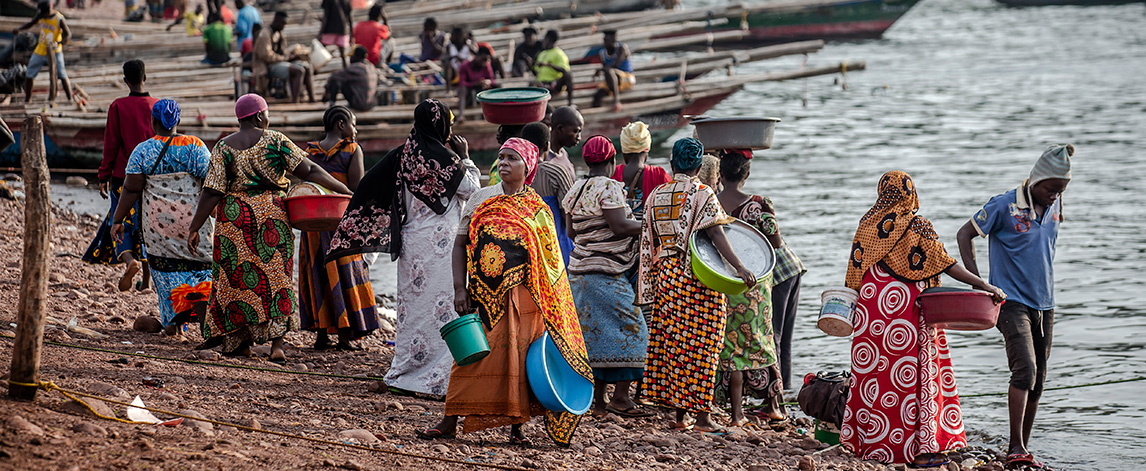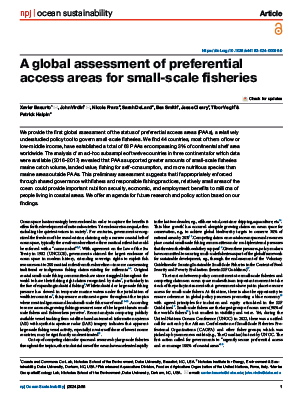Publications
Assessing the Financial Services Sector’s Leverage in Advancing a Sustainable Ocean Economy
Prior research suggests that the global financial services sector could influence the sustainability of the ocean economy, particularly with better information on companies’ externalities (Barbier 2023; Sumaila et al. 2021; Jouffray et al. 2019). This brief summarizes preliminary, non-peer-reviewed findings from ongoing research that explores the potential influence of the financial sector on the sustainability of the ocean economy. It aims to contribute to and inform policy discussions emerging from the United Nations Oceans Conference in June 2025.
Collection: Small-Scale Fisheries
Nature Portfolio has launched a new collection showcasing small-scale fisheries research conducted by the Illuminating Hidden Harvests (IHH) initiative.
Testing Factors that Enhance Private Participation in Payments for Ecosystem Service Programs Targeting Flood Mitigation
This report empirically examines the determinants of private participation in flood mitigation programs that use a payment for ecosystem services (PES) framework and suggests improved PES program designs and enhancements to their flood mitigation effectiveness. It offers evidence suggesting income from farming and potential participants' past experiences with PES programs may increase participation in programs aiming to mitigate flooding and that in turn could reduce economic damages from flooding impacts.
A Global Assessment of Preferential Access Areas for Small-Scale Fisheries
We provide the first global assessment of the status of preferential access areas (PAAs), a relatively understudied policy tool to govern small-scale fisheries. We find 44 countries, most of them of low or low-middle income, have established a total of 63 PAAs encompassing 3% of continental shelf area worldwide.
Improving Market-Based and Government-Run Adaptation Solutions for Mitigating Flood Risk Using Natural Infrastructure
The goal of this research is to understand the implications of using nature-based solutions, or natural infrastructure (NI), to mitigate the impacts of flooding. The two solutions I evaluate to supply NI are a program that financially incentivizes its supply by private landowners, and a government-run floodplain property acquisition program. This dissertation consists of three papers examining payments for ecosystem services (PES) programs in terms of enrollment, incentives, and outcomes.
Opportunities, Tradeoffs, and Caveats for Private Sector Involvement in US Floodplain Buyout Programs
The United States has increasingly relied on government-administered floodplain buyout programs to reduce flood risk and remove flood-damaged dwellings from floodplains. However, high transaction costs and long administrative timelines dramatically hamper buyout program efficiency. This report derives financial efficiency thresholds suggesting situational advantages to both private- and government-run buyout programs and also evaluates alternative institutional structures for implementing buyouts and novel mechanisms for financing buyouts
2023 Annual Trends in Plastics Policy: A Brief
In the first annual update of Annual Trends in Plastics Policy, Nicholas Institute researchers find that plastics policy enactment continues to surge and was not negatively affected by the COVID-19 pandemic. To better gauge policy implementation, researchers established a new effectiveness policy library to accompany the 2022 update. These studies indicate that, while underused in existing policy, greater governmental use of economic instruments (e.g., taxes, fees, levies) and information instruments (e.g., awareness campaigns to communicate other instruments to the public, education initiatives, etc.) would aid in enacting effective policies in the future.
Voluntary Commitments Made by the World’s Largest Companies Focus on Recycling and Packaging Over Other Actions to Address the Plastics Crisis
In a study published by the journal One Earth, Duke experts share findings from an examination of the types of commitments that corporations have made to address global plastic pollution. The authors find that, rather than tackle virgin plastics, most companies target packaging and general plastics and frequently emphasize recycling-related efforts. While many large and important companies are making commitments, significantly more efforts beyond plastic recycling are required to effectively address plastic pollution challenges.
The Evolving Global Plastics Policy Landscape: an Inventory and Effectiveness Review
Governments worldwide are increasingly adopting public policies, laws, and ordinances to reduce plastic pollution. To date, studies have not analyzed the content of, and trends in, these policies. Employing a content analysis and literature search, we set out to better understand: (i) governments responses to this problem over time, and (ii) the state of the available evidence on the effectiveness of policy responses.
A snapshot of the economic benefits from foreign bottom trawling in coastal West Africa: A mutually-beneficial trade in services, no winners or extractivism?
Large-scale fishing effort in the waters of tropical and lower income countries is predominantly driven by ‘distant water fishing fleets’ often owned by companies based in a small number of countries and has been associated with a range of negative environmental and social outcomes. West Africa is an example where such fleets are a dominant feature. In the waters of Guinea-Bissau, Guinea, Sierra Leone, Liberia and Ghana, 75% of all licensed bottom trawl vessels in 2017 either registered (‘flagged’) or largely owned in China.










